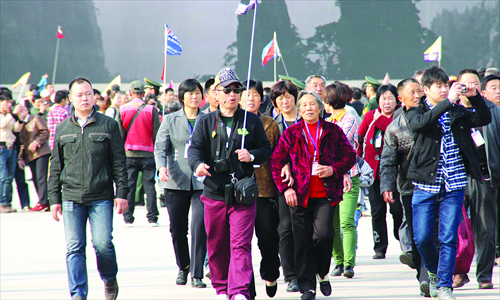HOME >> CHINA
Law of rude tourists
By Xinhua- Global Times Source:Xinhua-Global Times Published: 2013-8-25 22:13:01

A tour guide leads a group of visitors through Tiananmen Square in Beijing on April 27. Photo: CFP
For five successive days since Wednesday, Xinwen Lianbo, a flagship news program on China Central Television, has aired educational clips aimed at promoting polite tourist behavior.
The unusual move by Xinwen Lianbo, usually dedicated to political news and major events, is one of many indications of the country's efforts to reverse unfavorable stereotypes about Chinese tourists and improve the tarnished national image.
The move comes ahead of a new tourism law, which is set to take effect at the beginning of October.
China's image has been tarnished by a series of high-profile incidents of Chinese tourists behaving badly at home and abroad.
In May, a boy from Nanjing in East China's Jiangsu Province made international headlines after he carved graffiti on an Egyptian temple, causing anger across the country.
In another incident in July, tourists visiting the Xisha Islands in the South China Sea prompted outrage after they posted photos online showing them hunting endangered sea creatures, which they claimed to have later eaten.
Mixed reception
China ranks as the third biggest outbound tourist market and is the largest source of international tourism spending. Chinese travelers spent a record $102 billion overseas in 2012, according to a report by the United Nations World Tourism Organization.
However, the growing number of outbound visitors from the world's second largest economy has so far been a mixed blessing for the world. While countries welcome their penchant for generous spending, they have also been unnerved by the obnoxious behavior of a minority.
Spitting in the street, talking noisily in restaurants and fighting for space to take pictures, such uncivilized manners have damaged China's age-old image as a "country of etiquette."
Despite earning the nickname "walking wallets," even the purchasing power of Chinese tourists cannot help with the problem. In the most recent example, photographs showing some Chinese tourists bathing their feet in a pool in front of the Louvre created a storm online in China and courted harsh criticism, though pictures subsequently posted revealed that other foreigners also bathed their feet in the pool.
It's not just an issue with Chinese tourists overseas. A number of incidents involving domestic tourists have caused a surge of outrage online. This was the case when images surfaced of tourists throwing snowballs at frightened lions at Hangzhou Zoo in Zhejiang Province.
In an attempt to deal with the problem, the government is unveiling a new tourism law, which aims to teach tourists proper etiquette.
Tourism law
During a meeting in May to discuss the new tourism law, Vice-Premier Wang Yang called for more efforts to elevate the image of Chinese tourists as the country's tourist industry is in a "golden phase of development with vast potential."
Guidelines mandating good manners will soon be included into tourist contracts with travel agents and unruly holiday-makers will risk inflicting penalties, according to the National Tourism Agency.
Starting from October 1, the country's first tourism law will be fully implemented, making it legally binding for tourists to behave well and respect local customs and traditions.
However, the law will also protect tourists, and strengthen their right to complain when dealing with unethical tour operators, as well as take measures to limit price increases at tourism destinations.
Not everybody is impressed with the new law. In a commentary published on August 22, the Dalian Evening News pointed out that the new law lacked serious punishments for misbehaving tourists and as such would only have a limited effect.
Net users are also divided. One netizen pointed out on Weibo that most of the new regulations are based on common sense, which most people should already know, and said that hoping for imminent change would be unrealistic.
Changing standards
For Huang Chenwei, a veteran tour guide with the Shanghai-based Jinjiang Travel, carefully studying, understanding and respecting local customs and traditions are the most effective ways to avoid making any faux pas while visiting a foreign country.
For example, Huang reminds tourists in her group to pay attention to the way people in New Zealand enjoy themselves while picnicking at the seaside without littering. By following suit, she believes that Chinese tourists can win the respect of the island's locals.
In fact, respect from the international community is greatly valued by the country's general public.
"We are all informal diplomats when we visit foreign countries," said Yang Jinhui, a tour guide with Beijing Caissa International Travel Service.
"I believe Chinese tourists are all willing to make an effort to show the best of our culture and what they need is just a little guidance," Yang added.
The changing demographics of Chinese tourists may also be one solution to the problem. The Global Times earlier reported that while Chinese tourists have typically favored group tours, which are often loud and can leave a poor impression on locals, many younger tourists are instead opting to plan their own travel itineraries, paving the way for new forms of tourism.
Posted in: Society